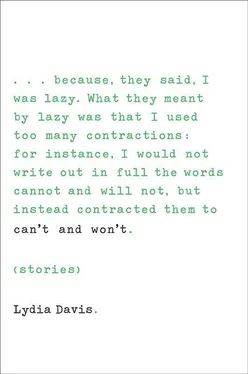I once asked a completely pointless question about halibut. I did not realize how pointless it was until the waitress had gone off to ask the chef. Pacific halibut is fine to eat, while Atlantic halibut is not. Even though I live on the Atlantic Coast, or near it, I asked her where the halibut was from, as though I had forgotten how far away the Pacific Ocean was, or as though halibut would be shipped all the way from the Pacific Coast to the Atlantic just for reasons of health or good fishing practices. As it happened, the restaurant was busy and she forgot to ask the chef, and by the time she returned I had realized that I should not order the halibut and was ready to order scallops instead. Scallops, my list said, were neither to be avoided nor to be eaten freely, but to be eaten with caution. I did not know what caution might mean in a restaurant situation, except perhaps that one should ask the waitress and the chef a few more questions than usual. But since even simple questions often did not produce very good answers, I did not expect good answers to detailed questions. Besides, I knew that the waitress and the chef did not have time for detailed questions. Certainly, if scallops were offered on the menu, the waitress or chef would not tell me they were endangered or unclean and advise me not to eat them. I ordered and ate them, and they were good, though I was a little uncomfortable, wondering whether they had been collected in the wrong way or contained toxic substances.
When I eat alone, I have no one to talk to and nothing to do but eat and drink, so my bites of food and my sips of wine are a little too deliberate. I keep thinking, It’s time to take another bite, or Slow down, the food is almost gone, the meal will be over too soon. I try to read my book in order to make some time go by before I take another bite or another sip. But I can hardly understand what is on the page because I am reading so little at a time. I am also distracted by the other people in the room. I like to watch the waiters and waitresses and other customers very closely, even if they are not very interesting.
The fish on the restaurant menu are often not on my list. Turbot in champagne sauce was offered one night at a very good French restaurant near where I live, but it was not on my list. I might have had it, but I was told by the waiter that it was a very mild fish, so I thought it was probably not very tasty. Also, it came with a cheese crust on it. I said I thought the crust would be too rich. The waiter said it was a very thin crust. Even so, I decided against it. There were other fish on the menu: red snapper, which my list instructed me to avoid; Atlantic cod, which was endangered; and salmon, but not wild Alaskan salmon. I gave up on fish and ordered the restaurant’s special plate of assorted vegetables, which arrived with small portions of many different vegetables, including fennel bulbs, arranged clockwise around a beautiful golden-brown molded potato cake. The different flavors of the vegetables were unexpectedly exciting, even though so many of them were root vegetables — not only carrots and potatoes, but also sautéed radishes, turnips, and parsnips.
The restaurant was owned by a couple from France. The wife greeted the guests and oversaw the service, and the husband cooked. As I left the restaurant that night, on my way to the parking lot I passed the windows of the kitchen. It was brightly lit and I stopped to look in. The chef was alone. He was dressed in white, wearing his chef’s cap, and he was slim and active, bent over his chopping block. As far as I could see from that distance, his features were finely modeled and delicate, his expression intense. As I watched, he tipped his head back slightly and tossed a bit of food into his mouth, pausing to savor it. A younger man came in from the left carrying a tray of something, put it down, and went out again. He did not appear to have anything to do with the cooking. The chef was alone again. I had never before seen a real chef at work, and had never imagined that a chef would work alone in his kitchen. I could have watched him for a long time, but I felt it would be indiscreet to stay, and I walked away.
The last time I ate by myself, I was in a restaurant I chose because there was no alternative. I was far out in the country and it was the only one open. I thought it would not be very good. It had a loud, popular bar in the front. I ordered a beer this time, and looked at the menu. The fish special was a marlin steak. I tried to think what marlin was. I had not thought of marlin for a long time. Then I pictured the fish sailing through the air with a large fin on its back, and I was almost sure it was popular for sport fishing, but I could not imagine what it tasted like. It was not on my list, but I ordered it anyway. Since I did not know whether I should avoid it, there was a chance that it was all right. Even if it wasn’t all right, of course, I could still occasionally have a fish that I should not have.
When she brought the fish, the waitress passed along a message from the chef: he would be waiting to know how I liked it; it was such a beautiful steak, he said. I was impressed by his enthusiasm, and as I ate, I paid more careful attention than usual. The chef had time to be interested in this marlin steak, I suppose, because it was a Monday night and only one other table was occupied in the large dining room, though as I ate my meal, a few more people came in. Even the bar had only two customers, small old men in plaid flannel shirts. But with the loud television and the laughter of the barmaid, who was also the hostess and the wife of the chef, the bar was still noisy.
The marlin was good, if a little chewy. When the waitress came by to see how I liked it, I did not tell her it was chewy. I told her it was very good, and that I liked the delicacy of the herbs in the sauce. At one point in the meal, as I continued eating slowly, this time without reading, the chef emerged from the kitchen in the distance. He was a tall man with a slight stoop to his shoulders. He walked over to the bar to have a drink and say a few words to his wife and the old men, and then walked back. Before he pushed through the swinging door, he turned a moment to look across the dining room in my direction, curious, I’m sure, to know who was eating his beautiful marlin steak. I looked back at him. I would have waved, but before I thought of it he disappeared through the door.
The serving of food on my plate, the marlin steak and baked potato and vegetables, was generous, and I could not eat all of it. I ate all the vegetables, at least, tender slices of lightly sautéed zucchini with thin strips of red pepper and herbs, and asked the waitress if she would wrap up the rest for me to take home. She was worried; I had eaten only half the fish. “But you did like it?” she asked. She was young. I thought she was the daughter of the chef and the barmaid. I assured her I had. Now I was worried; the chef might not believe I had truly liked the fish, though I had. There was nothing more I could say about it, but as I paid my bill, I told the waitress I had loved the vegetables. “Most people don’t eat them,” she said matter-of-factly. I thought of the waste, and the care with which the chef prepared, over and over again, the vegetables that no one ate. At least I had eaten his vegetables, and he would know that I had liked them. But I was sorry I had not eaten all of his marlin. I could have done that.
I was recently denied a writing prize because, they said, I was lazy. What they meant by lazy was that I used too many contractions: for instance, I would not write out in full the words cannot and will not , but instead contracted them to can’t and won’t.
Читать дальше












